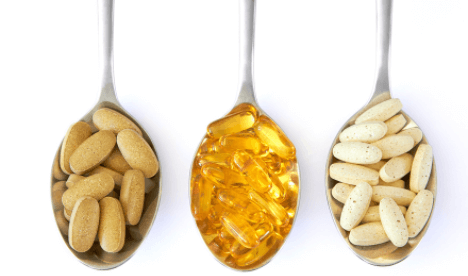To Vitamin or Not to Vitamin?
We’ve all been told to stay healthy by taking our vitamins, but we’ve also all been told that everyone is different. So how do we know which vitamins each person needs if we’re all different?
Many popular vitamin companies have created multivitamins specifically for both men and women, which seems a bit more personal. The idea behind the multivitamin is that it provides the necessary minerals for human growth and health. Multivitamins contain doses of several vitamins that are essential to human life and health such as Vitamins A, C, and D. They also contain minerals that produce necessary hormones in the body such as calcium, magnesium, and potassium.
Some of the vitamins within multivitamins are ones that cannot actually be made by the human body, such as Vitamin D. Other vitamins present in multivitamins are also present in whole foods such as fruits and vegetables, which are not always the first choice next to an easy to swallow pill.
For many people, taking a daily multivitamin has become a crutch for getting nutrients that the body needs. Instead of eating food that contain the necessary nutrients and minerals that the body thrives on, people have been taking multivitamin pills to try and make up for it. The problem with that is, multivitamins do not provide the full dosage of each vitamin that is actually necessary for optimal health.
Foods that contain the essential vitamins that human bodies need also provide other benefits such as fiber, protein, and healthy fats. Eating natural, real foods like fruit, vegetables, nuts, and meats is an easy way to put the necessary vitamins into your body along with nutrients that enhance your health in other ways, not just provide the bare minimum.
As far as preventing serious illnesses, NPR reported that the U.S. Preventive Services Task Force concluded that there was insufficient evidence to recommend for or against the use of multivitamins for prevention of cancer and heart disease. However, it has been proven in numerous studies that a diet containing vegetables and fruits an lower blood pressure, lower risk of eye and digestive problems, prevent cancers, and reduce risk of heart disease and stroke.
So if by eating whole foods we can gain all of the vital nutrients we need, is a multivitamin necessary? The Health Director of The Huffington Post claims that Americans are actually not deficient in any vitamins. Although processed and packaged food is not considered healthy, a great deal of it is fortified with vitamins and minerals that many Americans consume daily.
It is true that athletes and people with very physically active professions need more and different nutrients than the average person. That is when certain vitamins can definitely play a vital role in maintaining health and performance. Nutrients that increase the recovery and growth of muscles, enhance metabolism, and maintain energy levels are necessary and can often be found in multivitamins. However, the nutrients are most effectively absorbed when combined with a healthy diet.
It will always be the case that maintaining a healthy lifestyle by eating a well-balanced diet and exercising on a regular basis is the best possible thing to do for your body. In the case of the multivitamin, it is true that they absolutely provide beneficial and necessary nutrients. The key is to not rely on multivitamins for all health needs and focus more on diet and exercise. The multivitamin is the cherry on top of basic healthy living, ensuring that vital nutrients and minerals are present in the body.



































































































































